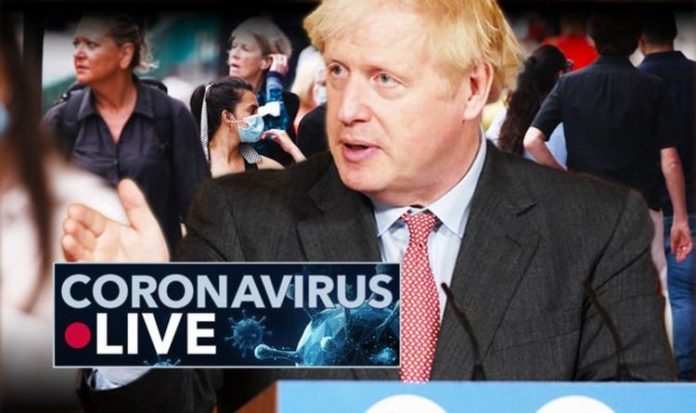The study, conducted by Imperial College London and Ipsos Mori, showed the rate of secondhand infection (R number), had dropped across the country, although case numbers still remain high. The experts involved within the study also claimed some measures, such as curfew on hospitality venues and the ‘rule of six’, seem to be working to curb the spread of the disease. Their finding were based on tests carried out on more than 80,000 people between Septmber 18 and 26. While these findings may suggest England may not need a second lockdown if the R-rate continues to drop, within the time frame of testing, one in 200 people were shown to have tested positive for coronavirus.
The R-rate is a crucial figures for the UK’s battle against the virus, as it states the number of secondhand infections.
Previously, the UK’s chief scientific adviser, Sir Patrick Vallance has claimed the R-rate must remain below one.
While the study has claimed the R-rate could be at 1.1, according to the Government, it is currently between 1.2-1.5.
Professor Paul Elliott, director of the programme at Imperial from the School of Public Health, told the MailOnline: “While our latest findings show some early evidence that the growth of new cases may have slowed, suggesting efforts to control the infection are working, the prevalence of infection is the highest that we have recorded to date.
“This reinforces the need for protective measures to limit the spread of the disease and the public’s adherence to these, which will be vital to minimise further significant illness and loss of life from Covid-19.”
Although this study provided a slight glimmer of light for England, cases in the UK rose by 7,108 yesterday, taking the total to 453,263.
FOLLOW BELOW FOR LIVE UPDATES:
7.44am update: Local lockdown may have prevented second wave
Speaking to the Today programme, former Health Secretary, Jeremy Hunt, claimed the local lockdowns in England may have prevented a second wave of the virus.
He said this morning: “I think the evidence from what happened earlier in the year, not just in this country but all over the world, is that acting early, decisively, quickly, is actually the best way to contain the spread of the virus and that’s what I think Chris Whitty and the Prime Minister are saying.
“One of the things that is often not noted about Italy was the successful way in which they managed to contain the outbreak of the virus in northern Italy, in Lombardy, and avoid it spreading to the rest of the country.
“Now, we didn’t manage to do that first time round but it just may be that these local lockdowns, although we haven’t seen a big reduction in transmission within those areas, they may just have contained it and stopped it from becoming the national outbreak that we had before.”
7.23am update: R-rate could be dropping
According to a study conducted by Imperial College London and Ipsos Mori, England’s infection rate could be as low as 1.1.
This suggested the spread of the virus is slowing, although as many as one in 200 of the 80,000 volunteers tested positive.
Professor Paul Elliott, director of the programme at Imperial from the School of Public Health, told MailOnline: “While our latest findings show some early evidence that the growth of new cases may have slowed, suggesting efforts to control the infection are working, the prevalence of infection is the highest that we have recorded to date.
“This reinforces the need for protective measures to limit the spread of the disease and the public’s adherence to these, which will be vital to minimise further significant illness and loss of life from Covid-19.”
The study also found the virus was passing through 18-24-year-olds at a higher rate than any other age group.
According to the study, one in 100 of the age group were infected with virus.







